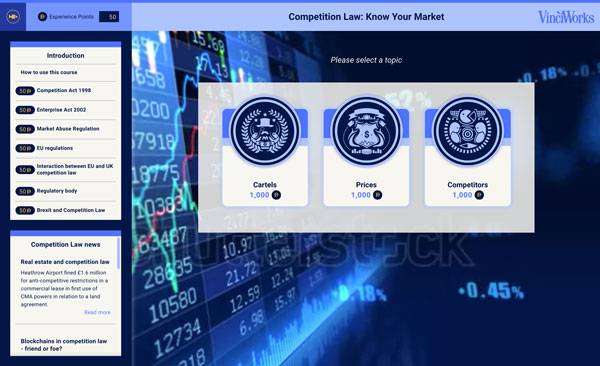Businesses have a responsibility and a legal obligation to follow competition law and ensure staff have the knowledge and understanding to do that. Companies should regularly update such policies. Staff should be made aware that failure to adhere to their company’s competition law policy could result in large fines and criminal charges against individual employees and the company.
VinciWorks has created a competition law policy template that is fully compliant with the Competition Act 1998 and the Enterprise Act 2002.
What should be included in a competition law policy?
Employee obligations with regards to competition law
Employees must report any activity, transaction or dealing which they suspect may infringe upon competition law to the relevant reporting officer. They must also report all contact with competitors where there was any discussion of contracts, competitors, suppliers, sub-contractors or other relevant external bodies to the reporting officer. Full minutes should be recorded of any trade association meetings that are attended by representatives of your organisation.
Discussions with competitors
Employees should seek advice from the reporting officer before accepting any social invitations from competitors or joining trade associations. This section should highlight the importance of reporting any informal agreements with a competitor as they could result in heavy fines being handed to both the employee involved and the organisation. Further, they should avoid all discussion of competition or competitive subjects with personnel from a competitor and make an obvious and clear action of breaking off such discussions should they arise.
Discussions with customers
Businesses should now try to control the territories in which their distributors may sell into. They must also not try to restrict distributors from buying, selling, or reselling competing products or try to control the pricing of any reseller customers or distributors. You may, however, accept information voluntarily given by customers as to the actions of competitors, including prices, terms, and any special promotions being offered.
Conduct relating to a dominant market share
There are certain instances whereby a company may, to a certain extent, behave independently of competitors, customers, and consumers. These conditions can occur where the business has a 40% or greater share of a particular market, including of supplies, or the purchase of goods or services on a particular market. A competition law policy should make clear the rules that apply to instances where a company has a dominant market share. For example, there are certain practices which are generally legal may become illegal where the company has a dominant market share.
Procedure for raising concerns under the policy
It is vital that staff understand who to report to should they have any concerns that the policy is not being adhered to. The process of reporting such concerns must be a completely confidential process.
Upcoming competition law training

VinciWorks will soon be releasing a new interactive course covering UK competition law. Competition Law: Know Your Market drops users into a set of immersive scenarios to test their knowledge, understanding and ability to comply with UK competition law. The course is broken into short modules that cover different aspects of UK competition law, including price-fixing, cartels and meetings with competitors. Each module contains simulations of real business dilemmas with key learning points related to the scenario.








